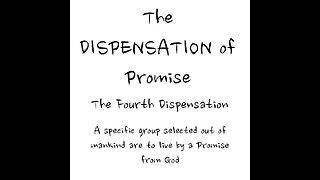Bible study 5B: What True Repentance is: The Most Important Promise: How Do I Receive the Gospel?
Bible Study 5B continues to answer the question "How Do I Receive the Gospel?" by explaining true repentance. God's most important promise is to save those who repent and believe in Jesus Christ. Study 5A explained what repentance is not, and 5C explains what saving faith is not and what it is.
“Repentance unto life” (Acts 11:18) is a change of mind about God and sin that results in a change of life. A lost sinner savingly repents when, out of the sight and sense not only of the danger, but also of the filthiness and odiousness of his sins, as contrary to the holy nature, and righteous law of God, and upon the apprehension of His mercy in Christ to such as are repentant, so grieves for, and hates his sins, as to turn from them all to God, purposing to endeavor to walk with Him in all the ways of His commandments.
True repentance has the following characteristics:
1.) Repentance is proceeded by the work of the Holy Spirit (John 16:8). Nobody will repent, or
believe the gospel, without the Holy Spirit giving him the desire and ability to do so. Genuine repentance is a gift from God (2 Timothy 2:25). God does not change His mind when He gives the gift of repentant faith (Romans 11:29), so one who has repented and believed the gospel will continue to be a repentant person—a repenter at heart. God irrevocably implants a characteristic rejection of sin, love for Christ and holiness, and submission to Scripture in all whom He gives the gifts of repentance and faith.
2.) Repentance is motivated by God’s goodness. “Despisest thou the riches of his goodness and forbearance and longsuffering; not knowing that the goodness of God leadeth thee to repentance?” (Romans 2:4; 1 John 4:10).
3.) Repentance is intellectual, volitional, and emotional. When you repent, you change your mind (Jeremiah 8:6). Give up false ideas about God, the Bible, and the way of salvation, acknowledge your sin, and receive as true all that Scripture says about the means of deliverance from it! Repentance is also volitional. It involves the will—you change your direction: “Repent, and turn yourselves from all your transgressions; so iniquity shall not be your ruin.” (Ezekiel 18:30) Give up your way for Christ and His commandments! Repentance is also emotional—you change your desires. A “godly sorrow worketh repentance to salvation” (2 Corinthians 7:10). To the lost man, sin, or at least certain types of sin, are a light thing, but the repentant man grieves for and hates his sins—sin is shameful to him, a burden he would rejoice to have removed (Ezekiel 6:9). A change of mind, direction, and desire are the three basic aspects of genuine repentance.
3.) Repentance involves agreeing with God, confessing: “thou hast done right, but we have done wickedly” (Nehemiah 9:33). You must agree with God that salvation is based only on the work of Jesus Christ, rather than your own works. You must recognize your damnation is just. You must agree that all that God says is sinful is truly so, and must be forsaken and detested.
4.) Repentance involves a desire to make things right (Luke 19:1-10). When one who has sinned against other people repents, he will confess his error to them as well as to God, and make restitution.
5.) Repentance involves turning from all known specific sins, as well as sin in general, to surrender unconditionally to Christ as Lord. The sinner must “forsake his way” (Isaiah 55:7) for God’s way. You must submit to Jesus Christ as “Lord of all” (Acts 10:36). Turn away from all your transgressions that you have committed, and you will surely live, and not die (Ezekiel 18:28). Your sins are your worst curse—to be delivered from them is a wonderful blessing. Is there some iniquity that you value more highly than you do the Son of God? If so, you cannot repent—but if you do not repent, you will surely be damned. Turn from the sinful world (Philippians 3:8). Turn from false religion (2 Corinthians 6:14-7:1). Turn from all self-righteousness (Luke 5:32). Turn to God through Christ (1 Thessalonians 1:9-10).
6.) Repentance involves taking up the cross (Mark 8:34-36). Deny yourself and take up the cross! Repentance results in following the Lord Jesus, no matter what the cost. If you wish to save your own way of life, you will eternally lose your life in hell; if you give up your own life for Christ, your soul will be saved.
7.) Repentance includes counting the cost (Luke 14:26-33). It is not an unthinking, careless commitment, but a definite decision to forsake everything for the Lord Jesus. Count the cost of becoming a Christian. Do you want to be holy? Will you forsake your pride and agree you are a miserable, hell-worthy sinner? Are you willing to turn from your sins to Christ? You cannot have both your sin and Christ. You must turn or burn (Luke 13:3; Revelation 21:8)!
Do you want Jesus Christ, whatever the cost? Then consider that repentance involves turning to Christ in faith. Watch Bible study 5C: learn about saving faith!
-
 16:14
16:14
ZeCabreira
1 year agoWhat does the Bible say about repentance?
2 -
 1:00:16
1:00:16
lcpittman
3 years agoBeyond Repentance. What Does God Care About Most? part 2 (of 10)
27 -
 13:42
13:42
GospelProof.com
2 years agoBible Study Tips - Repent - True Bible Meaning from the word of God. (KJV)
22 -
 1:22
1:22
OkieEarl
1 year agoReading Through the Bible - "Prayer of Repentance"
1 -
 5:15
5:15
yashuafreak
3 years agoBIBLE - AUTHORITY, APPLICATION, REPENTANCE
52 -
 28:29
28:29
Biblical Bible Prophecy Theologian
2 years agoThe Church (If the Church is not Teaching you Correctly, Repentance, Once Saved Always Saved - Flee)
48 -
 8:29
8:29
libertyordeathshow
5 months agoHe Grew Up In A Christian Home...I Encouraged Him In Understanding True Biblical Repentance
2121 -
 24:24
24:24
Biblical Bible Prophecy Theologian
2 years agoThe words Repent - Repentance - Repented is mention over 100 times in The Bible
32 -
 52:45
52:45
KJBRD Podcasts & Bible Studies
10 months agoDispensation of Promise (Bible Believing Bible Studies)
20 -
 22:35
22:35
JarrinJackson
2 years ago3-1-22 - Bible Study: John 14: 15-18 (Jesus promises another Helper)
1.35K9